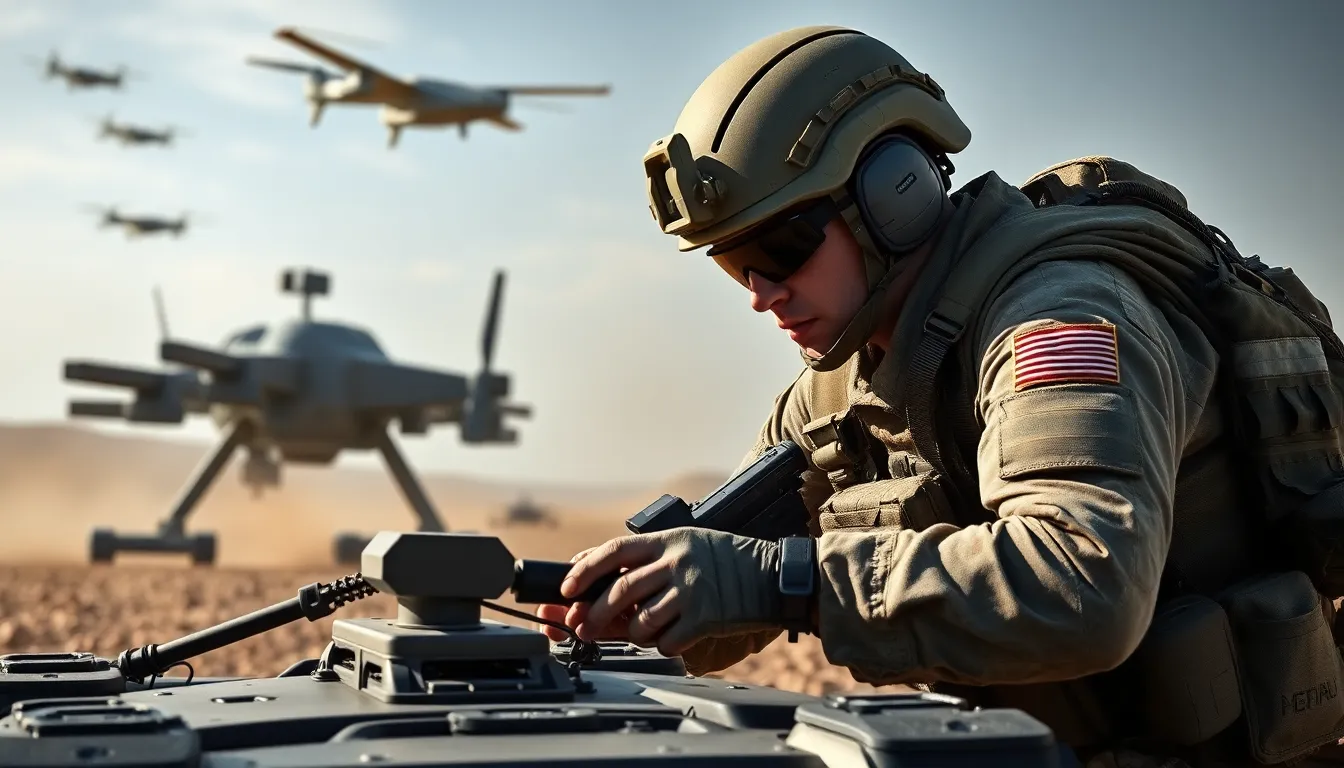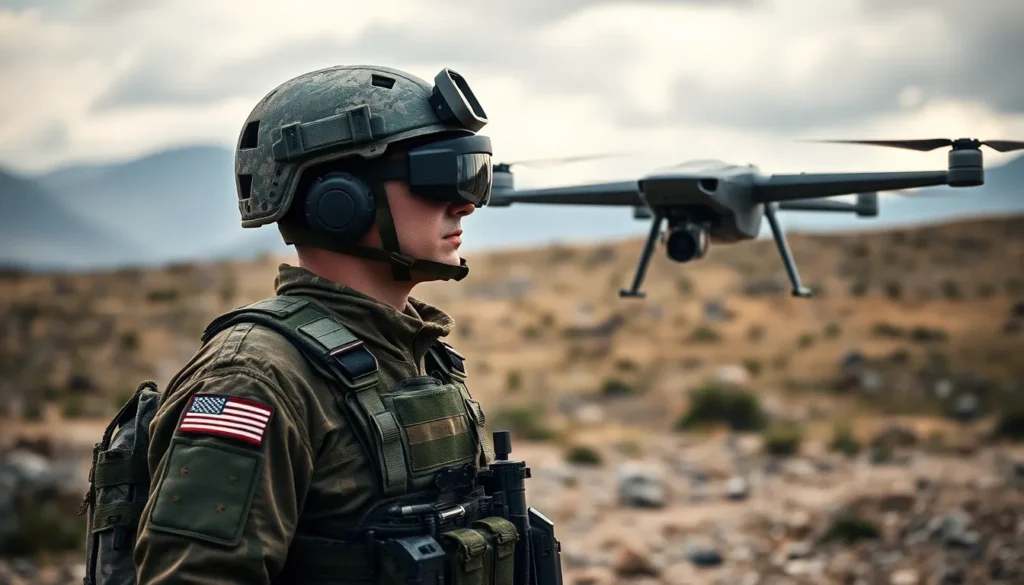The battlefield of the future is shaping up to be a high-tech playground where drones, AI, and advanced weaponry play tag with traditional tactics. Gone are the days of muddy boots and trench warfare; now it’s all about cyber warfare, unmanned vehicles, and smart technology. Picture soldiers equipped with augmented reality goggles, receiving live data while sipping their morning coffee—if only they could figure out how to brew it on the go!
As nations race to out-innovate each other, the stakes have never been higher. The future of warfare isn’t just about who has the biggest arsenal; it’s about who can think outside the box—or in this case, outside the battlefield. Buckle up as we explore how these advancements are not only changing the game but also keeping military strategists awake at night, wondering if they should’ve invested in a good old-fashioned compass.
Table of Contents
ToggleOverview of Battlefield Future
The future of the battlefield features an impressive array of technologies that reshape modern warfare. Drones play a significant role, offering enhanced surveillance and precision strike capabilities. Artificial intelligence supports decision-making processes, allowing military leaders to analyze vast amounts of data quickly.
Smart technology transforms the soldier’s experience in the field. Augmented reality systems provide real-time insights, improving situational awareness and reducing response times. This technology facilitates better communication among troops, ensuring coordination in complex environments.
Cyber warfare has emerged as a critical component in this evolving landscape. Attacks on infrastructure and digital systems can disrupt operations without the need for physical engagement. Nations invest heavily in cybersecurity to protect their assets and secure their networks.
The shift from traditional combat methods results in a need for innovative strategies. Conventional tactics often fall short against high-tech adversaries. Emphasis on creativity and adaptability in military planning becomes essential for success.
Collaboration across different branches of the military enhances operational effectiveness. Joint exercises that focus on multi-domain warfare prepare forces for the integrated nature of future conflicts. Strategic alliances with other nations further develop capabilities and share intelligence.
Future warfare hinges on the ability to leverage technologies while maintaining flexible strategies. Adapting to rapidly changing situations on the battlefield requires continuous training and development. The integration of these elements will define the next generation of military operations.
Key Technologies Shaping the Battlefield Future

Technological advancements are redefining modern warfare. This evolution emphasizes innovative capabilities essential for effective military operations.
Artificial Intelligence in Warfare
Artificial intelligence (AI) enhances battlefield decision-making through rapid data analysis. Military commanders interpret vast datasets quickly, identifying trends and threats in real-time. Predictive analytics support strategy formulation, allowing forces to counter emerging challenges dynamically. AI-driven systems can also automate logistics and maintenance, improving efficiency on the ground. Units equipped with AI capabilities increase situational awareness, providing soldiers with critical information at their fingertips. These advancements ultimately shift the focus from traditional combat strategies to intelligent systems that adapt in complex scenarios.
Advanced Weaponry and Robotics
Advanced weaponry and robotics are revolutionizing how military forces engage. Precision-guided munitions enable strikes with reduced collateral damage, ensuring targets are hit accurately. Unmanned aerial vehicles (UAVs) perform surveillance missions and conduct attacks without risking personnel. Robotic ground vehicles assist in reconnaissance and mine clearance, augmenting the capabilities of infantry units. Weapon systems integrated with AI support real-time targeting adjustments, enhancing operational effectiveness. Combat robots function alongside human soldiers, allowing for coordinated assaults that maximize efficiency. This technological synergy underscores the future battlefield’s reliance on automation and precision in achieving strategic objectives.
Strategic Implications of Battlefield Future
The future battlefield requires a fundamental shift in tactics and strategies. Traditional approaches cannot effectively counter advanced technologies. Military operations increasingly rely on agile strategies that incorporate real-time data analysis. Utilizing drones changes the dynamics of battlefield engagement, enabling precision strikes and reduced collateral damage. Emphasis on cyber warfare necessitates new defense mechanisms against potential threats, ensuring resilience. Collaboration among military branches enhances adaptability and resource sharing.
Global security faces significant impact due to evolving battlefield technologies. Nations must address increased cyber vulnerabilities that extend beyond physical borders. Unmanned systems amplify concerns regarding unauthorized usage and escalation of conflicts. Establishing strategic alliances becomes crucial for collective defense against shared threats. Additionally, the proliferation of advanced weaponry raises accountability questions among global powers. Prioritizing intelligence-sharing and joint exercises enhances preparedness against potential conflicts. Adapting to this new warfare paradigm shapes international relations and influences defense policies worldwide.
Ethical Considerations
Future warfare introduces complex ethical challenges associated with advanced technologies. Autonomous weapon systems raise concerns about accountability. Decision-making processes in combat often shift from humans to machines, which leads to moral dilemmas regarding life-and-death choices made by algorithms. Military leaders must grapple with the implications of deploying such technology.
AI’s role in warfare poses significant ethical questions. Predictive algorithms can enhance operational efficiency, but they also risk dehumanizing combat. Relying heavily on AI diminishes the responsibility traditionally held by human operators. Transparency becomes crucial to ensure these systems align with international humanitarian laws.
Drones and surveillance technologies impact privacy rights. Targeted strikes without trial challenge the principles of due process. Civilians caught in conflict areas may face increased risks due to airborne military actions. Ethical frameworks must evolve to address the implications of high-tech warfare on non-combatants.
Cyber warfare adds another layer of complexity. Attacks targeting infrastructure can disrupt essential services, posing indirect threats to civilian populations. Nations must consider the far-reaching effects of cyber capabilities, ensuring that strategies prioritize ethical conduct alongside tactical advantages.
International cooperation strengthens the ethical framework around future battlefield technologies. Collaborating with allies encourages standard-setting for the responsible use of military technology. Joint exercises and intelligence-sharing can promote best practices, ensuring that advancements in warfare consider both effectiveness and morality.
Setting guidelines for the use of innovative technologies is imperative. Prioritizing ethical considerations strengthens national security and upholds global standards. Developing a balanced approach between technological advancement and ethical responsibility is crucial for future military strategies.
The future battlefield is set to redefine the landscape of warfare through the integration of advanced technologies and innovative strategies. As military operations evolve, the focus will shift from traditional tactics to a reliance on intelligence and adaptability. The rise of drones and AI will enable precision and efficiency while reshaping engagement dynamics.
Ethical considerations will play a crucial role in guiding the development and deployment of these technologies. Nations must work together to establish frameworks that ensure responsible use and accountability in military operations. As global security landscapes shift, collaboration and strategic alliances will become essential for navigating the complexities of modern warfare. Embracing this transformation will not only enhance operational effectiveness but also redefine international relations in an increasingly interconnected world.








